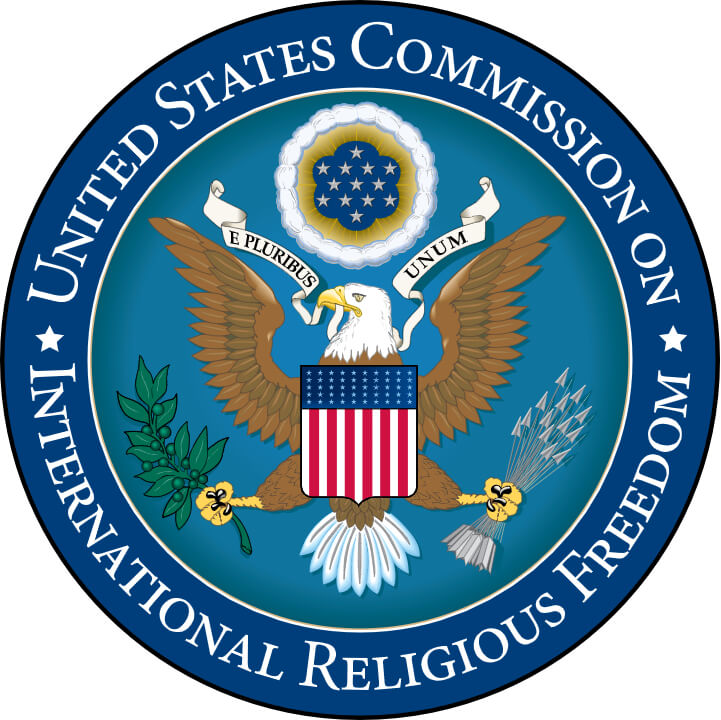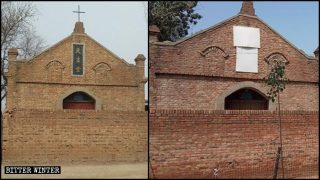
A U.S. bipartisan commission called on Tuesday for sanctions against entities deemed responsible for the persecution of Muslims in China’s Xinjiang Uyghur Autonomous Region (XUAR) and for the country to be placed on a State Department blacklist of the world’s worst abusers of religious freedoms.
U.S. President Donald Trump’s administration should “impose targeted sanctions on Chinese government agencies and officials responsible for severe violations of religious freedom—particularly Xinjiang Communist Party Secretary Chen Quanguo and former Political and Legal Affairs Commission Chief Zhu Hailun,” the U.S. Commission on International Religious Freedom (USCIRF) said in an annual report.
Specifically, the report called for a freeze on the officials’ assets and a bar on their entry into the United States “under human rights related financial and visa authorities, citing specific religious freedom violations.”
Additionally, the USCIRF recommended that Washington redesignate China as a Country of Particular Concern (CPC) “for engaging in systematic, ongoing, and egregious religious freedom violations.”
USCIRF said China had created a “high-tech surveillance state” using facial recognition and artificial intelligence to monitor religious minorities, including in the XUAR, where authorities are believed to have detained up to 1.8 million Uyghurs and other Muslim minorities in more than 1,300 internment camps since April 2017—numbers it noted had been revised upward since the previous reporting period.
On April 1, a new regulation requiring religious venues to have legal representatives and professional accountants went into effect, it said, noting that some smaller religious venues, especially in rural areas, found these requirements impossible to fulfill.
USCIRF said behavior deemed to be signs of “religious extremism,” such as wearing long beards and refusing alcohol, regularly lead to detention in the XUAR’s camps, where former detainees have reported being subjected to torture, rape, sterilization, and other abuses. It also noted that nearly half a million Muslim children have been separated from their families and placed in boarding schools in the region.
In 2019, internment camps in the XUAR “increasingly transitioned from reeducation to forced labor as detainees were forced to work in cotton and textile factories,” the report said, while the government continued to deploy officials to live with Muslim families and report any signs of “extremist” behavior.
Additionally, authorities in the region, and throughout China, have destroyed or damaged thousands of mosques and torn down Arabic-language signs from Muslim businesses, it said.
USCIRF called on the U.S. Congress to support the Uyghur Forced Labor Prevention Act, which would prohibit the importation to the United States of textiles, cotton, and other goods from the XUAR.
Tibet and elsewhere
The commission noted that in 2019, the Chinese government also “continued to pursue a strategy of forced assimilation and suppression of Tibetan Buddhism,” in particular through laws designed to control the next reincarnation of exiled Tibetan spiritual leader the Dalai Lama and those of other Tibetan eminent lamas.
During the summer of 2019, authorities demolished thousands of residences at the Yachen Gar Tibetan Buddhist center in Sichuan province, it said, while in April last year, authorities closed the Larung Gar Buddhist Academy in Sichuan to new enrollment.
In protest of repressive government policies, at least 156 Tibetans have self-immolated since February 2009.
USCIRF urged Congress to support the Tibetan Policy and Support Act of 2019 which would promote religious freedom in Tibet and penalize the Chinese government for interfering in the Dalai Lama’s succession.
Tuesday’s report also noted that Chinese authorities raided or shut down hundreds of Protestant house churches in 2019 and arrested thousands of Falun Gong practitioners for practicing the movement’s meditation exercises or distributing literature about their beliefs.
In a statement, USCIRF commissioner Tenzin Dorjee called China “the classic example of a ‘country of particular concern,’ or CPC, when it comes to religious freedom violations.”
“Millions of Uighurs are kept in concentration camps and according to the latest Freedom House Report, Tibet is second only to Syria in terms of religious freedom and human rights violations,” he said.
“The time is now for serious multilateral government and global policy actions to end ‘systematic, ongoing, and egregious’ religious freedom and human rights violations in China, including in Tibet and Xinjiang.”
‘At war with faith’
Speaking to RFA’s Tibetan Service on Tuesday, U.S. Ambassador at Large for International Religious Freedom Sam Brownback called for an end to “these systematic violations of religious freedom in Xinjiang, in Tibet, to the house church, to Falun Gong members, that are taking place throughout China.”
“This surveillance state has been growing—this is a feature of Chen Quanguo, the Communist Party chairman in Xinjiang who previously was in Tibet,” he said.
“He’s done it in Tibet, he’s doing it in Xinjiang, and it needs to stop … China’s been at war with faith now and certainly in recent years that war has intensified. They will not win this war against their own people’s faith.”
The U.S. State Department also issued a statement Tuesday calling on Beijing to release those “arbitrarily detained” in the XUAR and to “end its draconian policies” in the region.
“During this month-long observance of Ramadan—and at all times, we call on the PRC (People’s Republic of China) government to ensure that all Muslims and all religious believers can practice their faith in accordance with their beliefs,” the statement said.
“Contrary to Beijing’s narrative, those detained in internment camps are being held against their will, often times for simply exercising their right to freedom of religion or belief, including praying or wearing religious attire.”
Dolkun Isa, president of the Munich-based World Uyghur Congress (WUC) exile group, welcomed USCIRF’s report, which he said, “clearly highlighted the horrific treatment of the Uyghur Muslims under China’s brutal rule.”
“Without question, the Uyghur Muslims’ religious freedom has faced eradication by China while more than a billion Muslims around the world are celebrating Ramadan fasting and praying,” he told RFA’s Uyghur Service.
“I call on China to release the 3 million Uyghur and Kazakh Muslims detained in concentration camps, [as well as] Tibetan Buddhists and Chinese Christians from prison,” he added, using his organization’s estimate of the number of people held in the XUAR’s detention centers.
Matteo Mecacci, president of Washington-based International Campaign for Tibet ICT), applauded USCIRF’s call for the passage of the Tibetan Policy and Support Act in a statement Tuesday.
He urged Congress and the White House to adopt the act, which he said would “send a strong message to the communist government in Beijing that its attempts to control and dominate the lives of Tibetan Buddhists and other people of faith will face serious consequences from the United States and its allies.”
Reported by RFA’s Uyghur and Tibetan Services. Translated by Alim Seytoff. Written in English by Joshua Lipes.
Source: Copyright © 1998-2016, RFA. Used with the permission of Radio Free Asia, 2025 M St. NW, Suite 300, Washington DC 20036. https://www.rfa.org.



